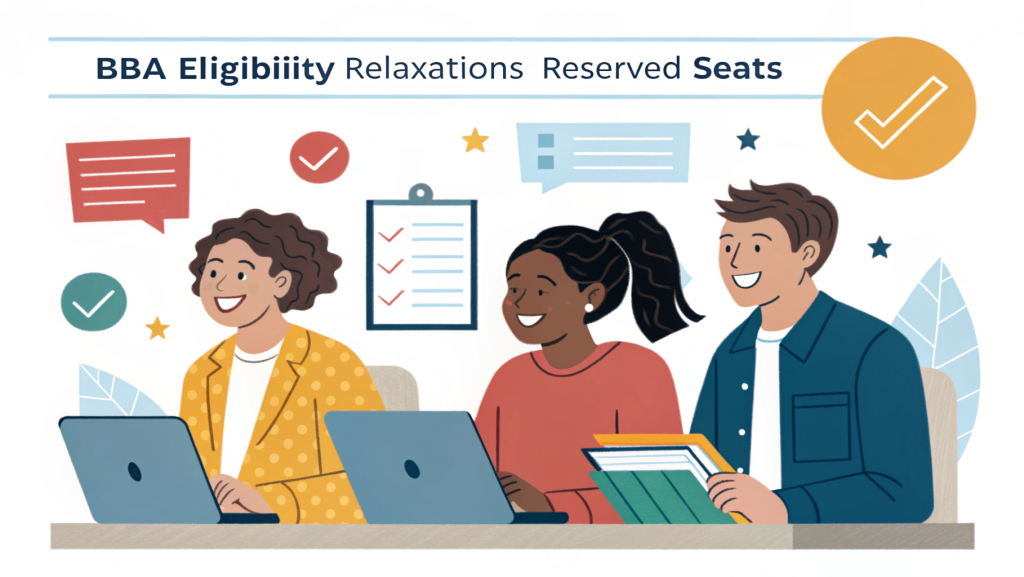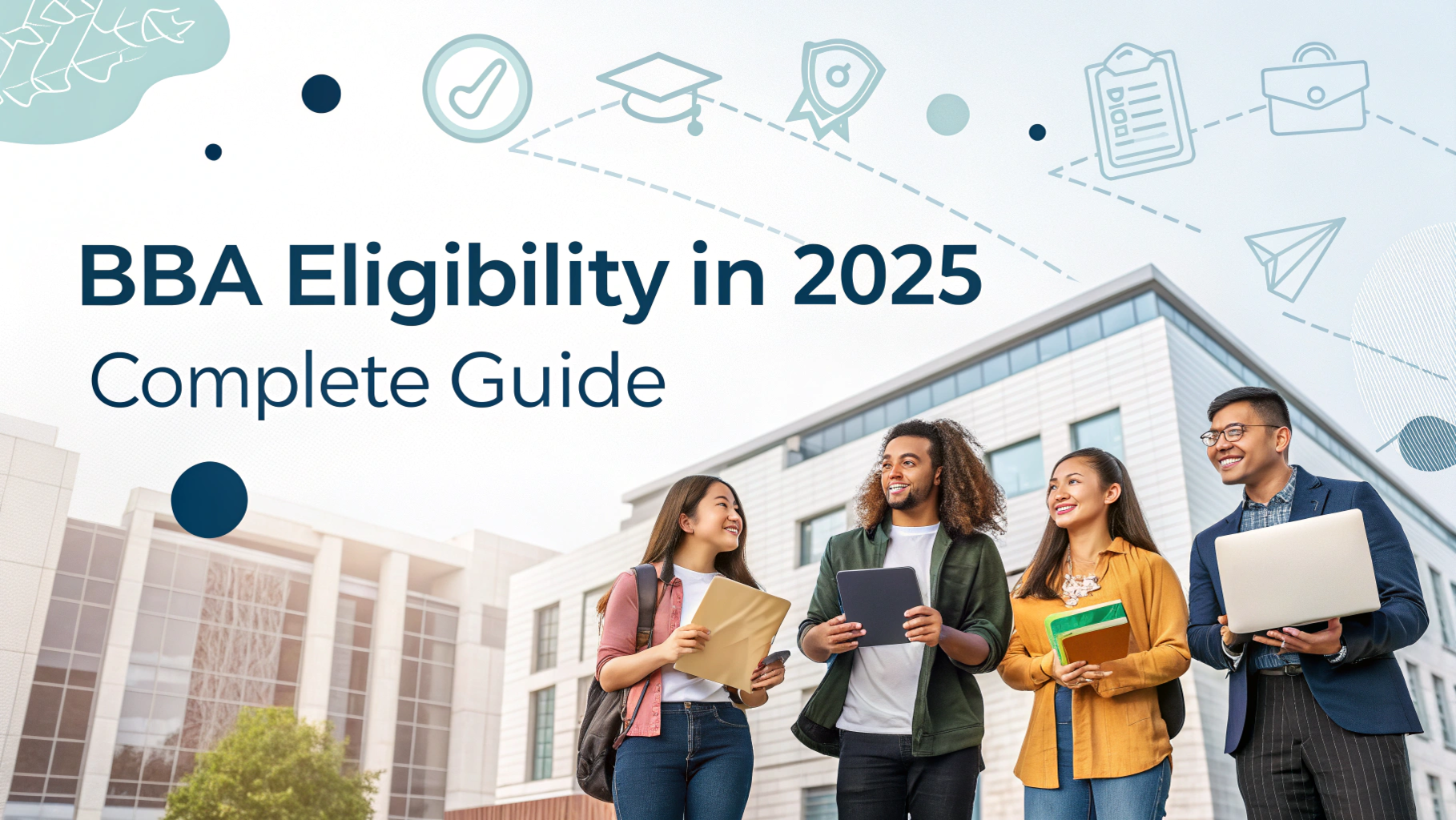Choosing the right undergraduate program is one of the most important decisions after completing school, and a Bachelor of Business Administration (BBA) is among the most popular options for students interested in management, business, and entrepreneurship. But before you apply, it’s essential to understand BBA eligibility in detail.
This guide will walk you through BBA eligibility, covering everything from the minimum educational qualifications and age limits to reserved category benefits, entrance exam requirements, and even the eligibility for online BBA programs. We’ll also outline the documents you’ll need during admission and answer common questions to make the process simple and stress-free.
Whether you’re a Class 12 student planning ahead or a working professional considering an online BBA, this article will give you clear, practical information on BBA eligibility to help you take your next step with confidence.
Minimum Educational Requirements: BBA Eligibility

To apply for a BBA program, the first thing colleges look at is your Class 12 (or equivalent) marks. Most universities ask for:
- Completion of 10+2 (from a recognized board like CBSE, ICSE, or any state board).
- Minimum marks: Usually 50%–60% in your Class 12 exams. Some top colleges may set the bar a little higher.
- Any stream is welcome – Commerce, Science, or Arts. You don’t need to have studied business subjects earlier.
In simple words: if you’ve finished your Class 12, scored decently, and have an interest in business or management, you’re good to go!
Age Limit for BBA Programs

Most BBA programs in India don’t have a strict age limit — which is great news! As long as you’ve passed Class 12, you can usually apply without worrying about your age.
That said, a few universities (especially government or entrance-exam-based ones) might prefer candidates below 22–25 years at the time of admission. This is more common in full-time, on-campus courses.
For online or distance BBA programs, there’s usually no upper age limit at all. So whether you’re fresh out of school or looking to switch careers later in life, there’s likely a program that fits your needs.
Eligibility for Reserved Categories

If you belong to a reserved category like SC, ST, OBC, EWS, or PwD, there’s some good news — many universities offer relaxations in eligibility to make things fair and inclusive.
Here’s how it usually works:
- Lower minimum marks: Instead of 50–60% in Class 12, reserved category students may get a relaxation of about 5%.
- Reserved seats: A certain percentage of seats are kept aside for different categories, as per government or university rules.
- Entrance exams: Cut-off scores are often slightly lower for reserved categories, making it easier to qualify.
The exact rules differ from college to college, so it’s always a good idea to check the university’s official website or admission brochure before applying.
if you’re from a reserved category, you may get some benefits — but you still need to meet the basic 10+2 qualification.
Entrance Exams for BBA (CUET, IPMAT, etc.)

While some colleges offer direct admission based on your Class 12 marks, many popular BBA programs require you to clear an entrance exam. These exams help universities pick students who are ready for a business-focused curriculum.
Some of the common entrance exams are:
- CUET (Common University Entrance Test) – Used by many central universities for BBA admissions.
- IPMAT (Integrated Program in Management Aptitude Test) – Conducted by IIMs for their 5-year integrated management programs.
- NPAT, SET, UGAT – Other popular exams accepted by private and deemed universities.
These exams generally test your:
- Quantitative ability (numbers, basic math)
- Logical reasoning
- Verbal ability (English comprehension)
- General knowledge (in some cases)
Tip: Even if an exam isn’t mandatory for a college, appearing for it can boost your chances at top BBA programs.
Eligibility for Online BBA Programs

Online BBA programs are becoming super popular, especially if you want flexibility or can’t attend a traditional college. The good news? Eligibility is usually simpler than regular BBA programs.
Here’s what most online BBA programs ask for:
- Completion of Class 12 from a recognized board (CBSE, ICSE, or state boards).
- Minimum marks are generally lower, often around 45–50%, but it can vary by university.
- No specific stream required – Science, Commerce, or Arts students can apply.
- No strict age limit – perfect for working professionals or anyone looking to upskill later in life.
Basically, if you’ve finished school and have a keen interest in business, an online BBA is very doable. Plus, it gives you the freedom to study at your own pace without worrying about campus timings.
Documents Required During Admission
Before you can secure your BBA seat, colleges will ask you to submit a few important documents. Don’t worry—it’s usually straightforward, and having everything ready will make the process smooth.
Here’s a typical list of documents you’ll need:
- Class 10 and 12 mark sheets and certificates – to prove your academic qualifications.
- Birth certificate or school leaving certificate – to verify your age.
- Photo ID proof – like Aadhar card, passport, or driving license.
- Passport-sized photographs – usually 4–6 copies.
- Caste certificate (if applicable) – for reserved category benefits.
- Entrance exam scorecard – if the college requires it.
- Migration certificate – if you’re moving from another board or state.
Pro tip: Always keep both originals and photocopies handy, as colleges may ask for verification. Having these ready in advance will make your admission process hassle-free.
Tips to Prepare for BBA Entrance Exams
Preparing for a BBA entrance exam doesn’t have to be stressful! With the right strategy and practice, you can boost your chances of scoring well. Here are some simple tips:
- Know the syllabus – Check the topics for quantitative ability, logical reasoning, English, and general knowledge. Knowing what to focus on saves a lot of time.
- Practice regularly – Solve previous years’ question papers and take mock tests. This helps you get comfortable with the exam pattern.
- Brush up your basics – Make sure your fundamentals in maths, grammar, and reasoning are clear. No complicated shortcuts needed!
- Time management – During practice, try to complete sections within the given time. This builds speed and accuracy.
- Read newspapers and current affairs – A little daily reading improves your general knowledge and English comprehension skills.
- Stay consistent and relaxed – Don’t cram everything at the last moment. A steady, calm approach works best.
Remember, entrance exams are just one step in your BBA journey. With regular practice and focus, you can tackle them confidently!
Conclusion
Understanding the eligibility criteria for BBA is the first step toward a smooth and successful admission process. From minimum educational requirements and age limits to reserved category benefits and entrance exams, knowing the rules helps you plan better and avoid last-minute confusion.
Whether you’re aiming for a traditional campus-based program or an online BBA, the key is to stay informed, keep your documents ready, and prepare strategically for entrance tests if needed. With the right approach, your journey toward a BBA degree can be simple, focused, and rewarding.
So, check your eligibility, pick the right program, and take your first step confidently toward a bright career in business and management!
Explore our online programs to become future-ready
Transform your career with industry-aligned courses designed by experts.
View All Courses
